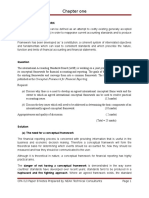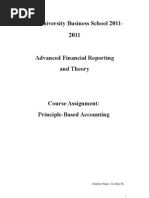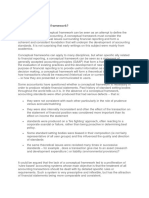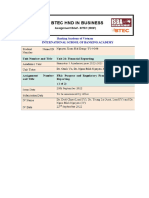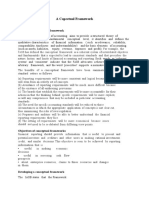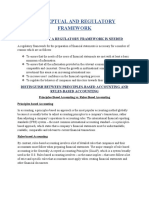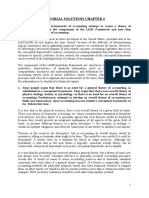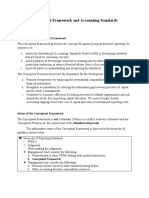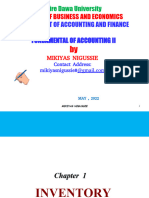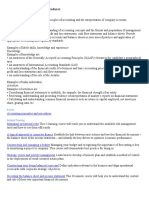SBR Writing Practices
Uploaded by
2021205266SBR Writing Practices
Uploaded by
2021205266FURTHER QUESTION CHAPTER 1
The International Accounting Standards Board (IASB) issued the revised Conceptual Framework for
Financial Reporting in March 2018.
Required
Discuss why it is beneficial to develop an agreed conceptual framework and to extent to which an
agreed conceptual framework can be used to resolve practical accounting issues.
Answer
It is beneficial to develop an agreed conceptual framework. This is because the conceptual
framework provides the basis for the International Accounting Standards Board to develop a new
accounting standard and revised the existing accounting standards. The conceptual framework is
concern in providing useful information for the sake of business and economic decisions of its
primary users. The conceptual framework provides theoretical basis on how to deal with elements
and items in the financial statements, how to measure them and the recognition criteria for each
item.
The disadvantage of not having a conceptual framework can be seen in the countries’ which
develop standards in a non-systematic way. Without a conceptual framework, standards are
developed when there is problem arises or when any issue emerge. If the conceptual framework
exists, it helps standardising the rules developed by the standard setting bodies.
Without a conceptual framework, the accounting standards will be governed by specific rules
instead of general principle. The specific rules are more exposed to the manipulation than the
general principle. For example, the preparers might manipulate its accounting report in order to
present a favourable result.
With the existence of conceptual framework, standard setters can overcome the political
pressure from various groups and interested parties.
Can it be used to resolve practical accounting issues?
Since the conceptual framework are merely a basis for developing a standard, it cannot provide all
answers to standard setters. It only helps to decide on alternatives and narrowing down the selection
of alternatives when dealing with an issue. The IASB are using the conceptual framework to help
standardising the standards and eliminating the inconsistencies.
The framework cannot provide answers to all practical accounting issues because:
(1) Since there are many users of the financial statements,
It is beneficial to develop an agreed conceptual framework. This is because, the conceptual
framework provides the basis for the International Accounting Standard Board’s development of new
accounting standards and for revise of the existing standards. The financial reporting process is
concerned with providing information that is useful in the business and economic decision-making
process. Therefore, a conceptual framework will form the theoretical basis for determining which
events should be accounted for, how they should be measured and how they should be
communicated to the users.
Although it is theoretical in nature, a conceptual framework for financial reporting has highly
practical final aims.
The disadvantage of not having a conceptual framework can be seen in the way some
countries’ standards have developed over recent years, standards tend to be produced in a non-
systematic (haphazard) and fire-fighting approach. When conceptual framework exists, the standard
setting body builds the accounting rules on the basis of standardise, agreed basic principles.
The lack of conceptual framework also means that fundamental principles are tackled more
than once in different standards, which can produce contradictions and inconsistencies in accounting
standards. This leads to ambiguity and it affects the true and fair concept of financial reporting.
Fire-fighting approach: bila ada problem baru lah nk buat action
Ambiguity: unclearness, having more than one meaning
Without a conceptual framework, the financial reporting environment is expose to the risk of
being governed by the specific rules instead of the general principles. The rules-based approach is
much more open to manipulation than a principles-based one.
A conceptual framework can also help to overcome the political pressure from various ‘lobby
groups’ and interested parties. Such pressure would only prevail if it was acceptable under the
conceptual framework.
Can it resolve practical accounting issues?
A framework cannot provide all the answers for the standard setters. It can only provide
principles which can be used when deciding between alternatives, and can narrow the range of
alternatives that can be considered. The IASB intends to use the principles laid out in the conceptual
framework as the basis for all futures IFRS Accounting Standards, which should help to eliminate
inconsistencies between standards.
However, a conceptual framework is unlikely on past form, to provide all the answers to
practical accounting problems. There are a number of reasons for this:
(1) Financial statements are intended for a variety of users, and it is not certain that a single
conceptual framework can be devised which will suit all users.
(2) Given the diversity of user requirements, there may be a need for a variety of accounting
standards, each produced for a different purpose (and with different concepts as a basis)
(3) It is not clear that a conceptual framework makes the task of preparing and then
implementing standards any easier than without framework.
You might also like
- Accounting Theory Summary Conceptual Framework100% (6)Accounting Theory Summary Conceptual Framework9 pages
- Chapter One: (A) Discuss Why There Is A Need To Develop An Agreed International Conceptual Frame Work and TheNo ratings yetChapter One: (A) Discuss Why There Is A Need To Develop An Agreed International Conceptual Frame Work and The9 pages
- Hull University Business School 2011-2011: Student Name: So Min PoNo ratings yetHull University Business School 2011-2011: Student Name: So Min Po10 pages
- Chapter 1 Accounting Theory and Conceptual FrameworksNo ratings yetChapter 1 Accounting Theory and Conceptual Frameworks61 pages
- AC2091-2023- Financial Reporting SG (1)No ratings yetAC2091-2023- Financial Reporting SG (1)20 pages
- The need for and an understanding of a conceptual frameworkNo ratings yetThe need for and an understanding of a conceptual framework5 pages
- The Greater Emphasis On The Conceptual FrameworkNo ratings yetThe Greater Emphasis On The Conceptual Framework10 pages
- CONCEPTUAL FRAMEWORK PROGRAMME - VIII - (B)No ratings yetCONCEPTUAL FRAMEWORK PROGRAMME - VIII - (B)8 pages
- Financial Accounting for Decision Makers 10th Edition Book and MyLab Accounting Pack (Peter Atrill, Eddie McLaney) (Z-Library)_193No ratings yetFinancial Accounting for Decision Makers 10th Edition Book and MyLab Accounting Pack (Peter Atrill, Eddie McLaney) (Z-Library)_1931 page
- Financial Reporting (F7) : Conceptual FrameworkNo ratings yetFinancial Reporting (F7) : Conceptual Framework3 pages
- Chapter 3 Applying Theory To AccountingNo ratings yetChapter 3 Applying Theory To Accounting12 pages
- Chapter 21 Regulatory and Conceptual FrameworkNo ratings yetChapter 21 Regulatory and Conceptual Framework13 pages
- (Part 2) Conceptual Framework (Doni, Bagas, Papin)No ratings yet(Part 2) Conceptual Framework (Doni, Bagas, Papin)30 pages
- The Need For and An Understanding of A Conceptual FrameworkNo ratings yetThe Need For and An Understanding of A Conceptual Framework5 pages
- A Conceptual Framework For Financial Accounting and ReportingNo ratings yetA Conceptual Framework For Financial Accounting and Reporting6 pages
- Assignment Intermediate Accounting CH 123No ratings yetAssignment Intermediate Accounting CH 1235 pages
- Conceptual Framework Notes and QuestionsNo ratings yetConceptual Framework Notes and Questions5 pages
- Criticisms of The Ifrs Conceptual FrameworkNo ratings yetCriticisms of The Ifrs Conceptual Framework9 pages
- Chapter 2 - Financial Reporting - Its Conceptual FrameworkNo ratings yetChapter 2 - Financial Reporting - Its Conceptual Framework34 pages
- International Financial Reporting (2021/22)No ratings yetInternational Financial Reporting (2021/22)13 pages
- Case Study 4.3 Revisiting The Conceptual FrameworkNo ratings yetCase Study 4.3 Revisiting The Conceptual Framework4 pages
- Conceptual Framework and Accounting StandardsNo ratings yetConceptual Framework and Accounting Standards3 pages
- Comments On The Proposed Conceptual FrameworkNo ratings yetComments On The Proposed Conceptual Framework5 pages
- A Conceptual Framework Is An Important Aspect of Modern Accounting'No ratings yetA Conceptual Framework Is An Important Aspect of Modern Accounting'6 pages
- Information & Management: Trang Nguyen, Jengchung Victor Chen, Thu Phuong Ha NguyenNo ratings yetInformation & Management: Trang Nguyen, Jengchung Victor Chen, Thu Phuong Ha Nguyen15 pages
- Unit 1 The Reporting Environment - CF - IAS 1 and IAS 8 - Handout and Tutorial QuestionNo ratings yetUnit 1 The Reporting Environment - CF - IAS 1 and IAS 8 - Handout and Tutorial Question23 pages
- Accounts of Company: by Haneef Ahmed BhattiNo ratings yetAccounts of Company: by Haneef Ahmed Bhatti30 pages
- Sesi 11 - ch21 - Lease Part 2 - Rev 221121No ratings yetSesi 11 - ch21 - Lease Part 2 - Rev 22112169 pages
- Wolters Kluwer Onesumx Ifrs Solution PrimerNo ratings yetWolters Kluwer Onesumx Ifrs Solution Primer8 pages
- SAP S - 4HANA Cloud For Contract & Lease Management ... - SAP CommunityNo ratings yetSAP S - 4HANA Cloud For Contract & Lease Management ... - SAP Community1 page
- Cover & Table of Contents - Intermediate Accounting (14th Edition)100% (1)Cover & Table of Contents - Intermediate Accounting (14th Edition)36 pages
- Ias 1 Presentation of Financial StatementsNo ratings yetIas 1 Presentation of Financial Statements30 pages
- Comprehensive Examination Afar - Reviewer - For PrintingNo ratings yetComprehensive Examination Afar - Reviewer - For Printing9 pages
- Lesson 2: Financial Reporting StandardsNo ratings yetLesson 2: Financial Reporting Standards25 pages
- Part 1 Recognition, Measurement, Valuation & Disclosure (Liabilities, Equity)No ratings yetPart 1 Recognition, Measurement, Valuation & Disclosure (Liabilities, Equity)24 pages
- Chapter 1-Fundamentals of Financial AccountingNo ratings yetChapter 1-Fundamentals of Financial Accounting20 pages




